Equality in Education关于教育公平的大学英语作文
- 格式:docx
- 大小:15.34 KB
- 文档页数:1
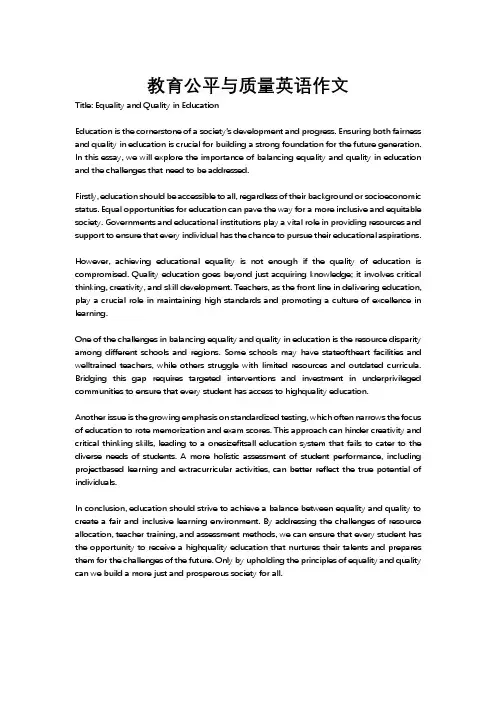
教育公平与质量英语作文Title: Equality and Quality in EducationEducation is the cornerstone of a society’s development and progress. Ensuring both fairness and quality in education is crucial for building a strong foundation for the future generation. In this essay, we will explore the importance of balancing equality and quality in education and the challenges that need to be addressed.Firstly, education should be accessible to all, regardless of their background or socioeconomic status. Equal opportunities for education can pave the way for a more inclusive and equitable society. Governments and educational institutions play a vital role in providing resources and support to ensure that every individual has the chance to pursue their educational aspirations.However, achieving educational equality is not enough if the quality of education is compromised. Quality education goes beyond just acquiring knowledge; it involves critical thinking, creativity, and skill development. Teachers, as the front line in delivering education, play a crucial role in maintaining high standards and promoting a culture of excellence in learning.One of the challenges in balancing equality and quality in education is the resource disparity among different schools and regions. Some schools may have stateoftheart facilities and welltrained teachers, while others struggle with limited resources and outdated curricula. Bridging this gap requires targeted interventions and investment in underprivileged communities to ensure that every student has access to highquality education.Another issue is the growing emphasis on standardized testing, which often narrows the focus of education to rote memorization and exam scores. This approach can hinder creativity and critical thinking skills, leading to a onesizefitsall education system that fails to cater to the diverse needs of students. A more holistic assessment of student performance, including projectbased learning and extracurricular activities, can better reflect the true potential of individuals.In conclusion, education should strive to achieve a balance between equality and quality to create a fair and inclusive learning environment. By addressing the challenges of resource allocation, teacher training, and assessment methods, we can ensure that every student has the opportunity to receive a highquality education that nurtures their talents and prepares them for the challenges of the future. Only by upholding the principles of equality and quality can we build a more just and prosperous society for all.。
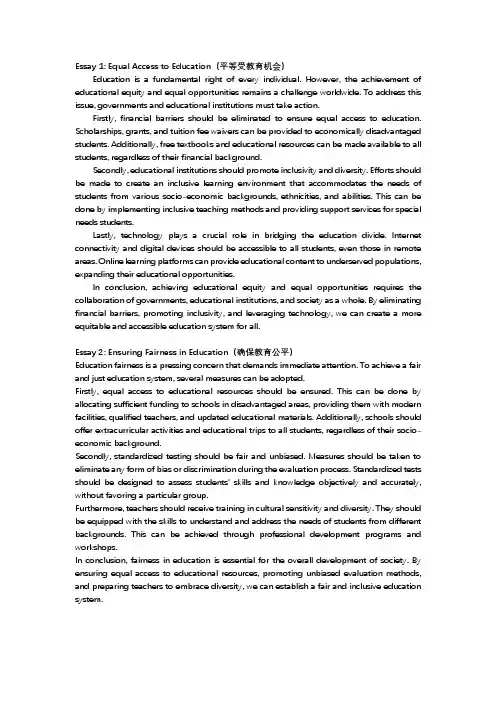
Essay 1: Equal Access to Education(平等受教育机会)Education is a fundamental right of every individual. However, the achievement of educational equity and equal opportunities remains a challenge worldwide. To address this issue, governments and educational institutions must take action.Firstly, financial barriers should be eliminated to ensure equal access to education. Scholarships, grants, and tuition fee waivers can be provided to economically disadvantaged students. Additionally, free textbooks and educational resources can be made available to all students, regardless of their financial background.Secondly, educational institutions should promote inclusivity and diversity. Efforts should be made to create an inclusive learning environment that accommodates the needs of students from various socio-economic backgrounds, ethnicities, and abilities. This can be done by implementing inclusive teaching methods and providing support services for special needs students.Lastly, technology plays a crucial role in bridging the education divide. Internet connectivity and digital devices should be accessible to all students, even those in remote areas. Online learning platforms can provide educational content to underserved populations, expanding their educational opportunities.In conclusion, achieving educational equity and equal opportunities requires the collaboration of governments, educational institutions, and society as a whole. By eliminating financial barriers, promoting inclusivity, and leveraging technology, we can create a more equitable and accessible education system for all.Essay 2: Ensuring Fairness in Education(确保教育公平)Education fairness is a pressing concern that demands immediate attention. To achieve a fair and just education system, several measures can be adopted.Firstly, equal access to educational resources should be ensured. This can be done by allocating sufficient funding to schools in disadvantaged areas, providing them with modern facilities, qualified teachers, and updated educational materials. Additionally, schools should offer extracurricular activities and educational trips to all students, regardless of their socio-economic background.Secondly, standardized testing should be fair and unbiased. Measures should be taken to eliminate any form of bias or discrimination during the evaluation process. Standardized tests should be designed to assess students' skills and knowledge objectively and accurately, without favoring a particular group.Furthermore, teachers should receive training in cultural sensitivity and diversity. They should be equipped with the skills to understand and address the needs of students from different backgrounds. This can be achieved through professional development programs and workshops.In conclusion, fairness in education is essential for the overall development of society. By ensuring equal access to educational resources, promoting unbiased evaluation methods, and preparing teachers to embrace diversity, we can establish a fair and inclusive education system.Essay 3: Breaking Barriers for Educational Equality(打破教育平等的障碍)Educational equality is a fundamental principle that every society should strive to achieve. Breaking barriers and creating an equal playing field is crucial in this regard.Firstly, socio-economic status should not hinder access to quality education. Scholarships and grants should be offered to economically disadvantaged students, enabling them to pursue higher education without financial burdens. Furthermore, vocational training programs can equip individuals with practical skills, enhancing their employment prospects.Secondly, gender disparities in education should be eliminated. Girls' education should be prioritized and encouraged, ensuring equal opportunities for both sexes. Awareness campaigns and community support can help change societal attitudes towards girls' education and challenge traditional gender roles.Moreover, schools should implement inclusive policies to cater to students with disabilities. Specialized facilities, assistive technologies, and trained personnel should be employed to provide an inclusive learning environment. Additionally, awareness programs should be conducted to promote inclusivity and discourage discrimination based on physical or mental disabilities.In conclusion, achieving educational equality requires concerted efforts from governments, communities, and educational institutions. By addressing socio-economic barriers, eliminating gender disparities, and promoting inclusivity for students with disabilities, we can create a society where everyone has an equal opportunity to realize their educational potential.。
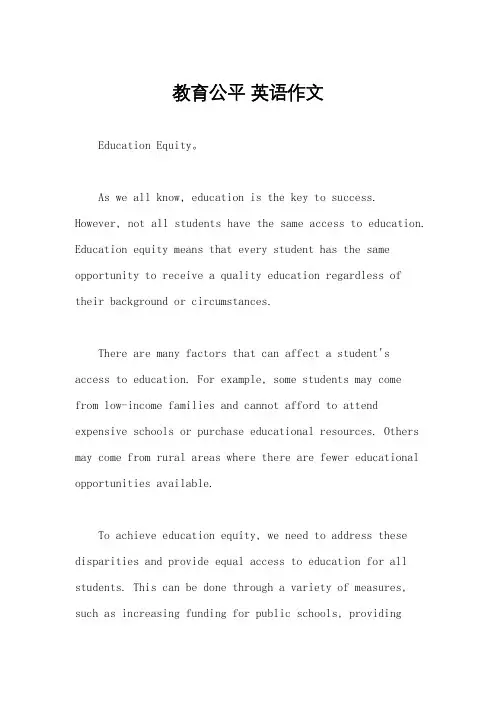
教育公平英语作文Education Equity。
As we all know, education is the key to success. However, not all students have the same access to education. Education equity means that every student has the same opportunity to receive a quality education regardless of their background or circumstances.There are many factors that can affect a student's access to education. For example, some students may come from low-income families and cannot afford to attend expensive schools or purchase educational resources. Others may come from rural areas where there are fewer educational opportunities available.To achieve education equity, we need to address these disparities and provide equal access to education for all students. This can be done through a variety of measures, such as increasing funding for public schools, providingscholarships and grants to low-income students, and improving access to educational resources in rural areas.In addition, we need to ensure that all students have access to high-quality teachers and curriculums. This means investing in teacher training programs and developing curriculums that are inclusive and culturally responsive.Another important aspect of education equity is addressing the achievement gap. This refers to thedisparities in academic achievement between differentgroups of students, such as students of different races or socioeconomic backgrounds. To address this gap, we need to provide targeted support and resources to students who are struggling academically.Overall, achieving education equity requires aconcerted effort from all stakeholders, including educators, policymakers, and community members. By working together,we can ensure that every student has the opportunity to succeed and reach their full potential.。
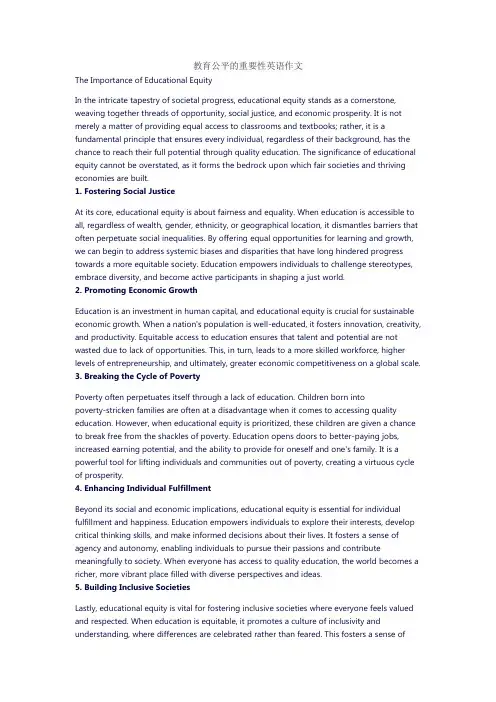
教育公平的重要性英语作文The Importance of Educational EquityIn the intricate tapestry of societal progress, educational equity stands as a cornerstone, weaving together threads of opportunity, social justice, and economic prosperity. It is not merely a matter of providing equal access to classrooms and textbooks; rather, it is a fundamental principle that ensures every individual, regardless of their background, has the chance to reach their full potential through quality education. The significance of educational equity cannot be overstated, as it forms the bedrock upon which fair societies and thriving economies are built.1. Fostering Social JusticeAt its core, educational equity is about fairness and equality. When education is accessible to all, regardless of wealth, gender, ethnicity, or geographical location, it dismantles barriers that often perpetuate social inequalities. By offering equal opportunities for learning and growth, we can begin to address systemic biases and disparities that have long hindered progress towards a more equitable society. Education empowers individuals to challenge stereotypes, embrace diversity, and become active participants in shaping a just world.2. Promoting Economic GrowthEducation is an investment in human capital, and educational equity is crucial for sustainable economic growth. When a nation's population is well-educated, it fosters innovation, creativity, and productivity. Equitable access to education ensures that talent and potential are not wasted due to lack of opportunities. This, in turn, leads to a more skilled workforce, higher levels of entrepreneurship, and ultimately, greater economic competitiveness on a global scale.3. Breaking the Cycle of PovertyPoverty often perpetuates itself through a lack of education. Children born intopoverty-stricken families are often at a disadvantage when it comes to accessing quality education. However, when educational equity is prioritized, these children are given a chance to break free from the shackles of poverty. Education opens doors to better-paying jobs, increased earning potential, and the ability to provide for oneself and one's family. It is a powerful tool for lifting individuals and communities out of poverty, creating a virtuous cycle of prosperity.4. Enhancing Individual FulfillmentBeyond its social and economic implications, educational equity is essential for individual fulfillment and happiness. Education empowers individuals to explore their interests, develop critical thinking skills, and make informed decisions about their lives. It fosters a sense of agency and autonomy, enabling individuals to pursue their passions and contribute meaningfully to society. When everyone has access to quality education, the world becomes a richer, more vibrant place filled with diverse perspectives and ideas.5. Building Inclusive SocietiesLastly, educational equity is vital for fostering inclusive societies where everyone feels valued and respected. When education is equitable, it promotes a culture of inclusivity and understanding, where differences are celebrated rather than feared. This fosters a sense ofbelonging and community, strengthening social cohesion and reducing conflict. Inclusive societies are more resilient, innovative, and capable of addressing the complex challenges of the 21st century.In conclusion, the importance of educational equity cannot be underestimated. It is a fundamental pillar of social justice, economic growth, poverty eradication, individual fulfillment, and inclusive societies. As we strive to build a better world for all, let us prioritize educational equity, ensuring that every child, regardless of their circumstances, has the opportunity to reach for the stars and fulfill their dreams.。
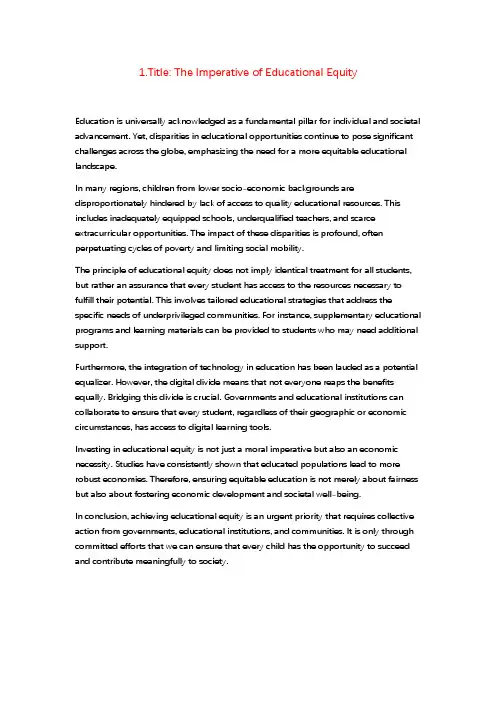
1.Title: The Imperative of Educational EquityEducation is universally acknowledged as a fundamental pillar for individual and societal advancement. Yet, disparities in educational opportunities continue to pose significant challenges across the globe, emphasizing the need for a more equitable educational landscape.In many regions, children from lower socio-economic backgrounds are disproportionately hindered by lack of access to quality educational resources. This includes inadequately equipped schools, underqualified teachers, and scarce extracurricular opportunities. The impact of these disparities is profound, often perpetuating cycles of poverty and limiting social mobility.The principle of educational equity does not imply identical treatment for all students, but rather an assurance that every student has access to the resources necessary to fulfill their potential. This involves tailored educational strategies that address the specific needs of underprivileged communities. For instance, supplementary educational programs and learning materials can be provided to students who may need additional support.Furthermore, the integration of technology in education has been lauded as a potential equalizer. However, the digital divide means that not everyone reaps the benefits equally. Bridging this divide is crucial. Governments and educational institutions can collaborate to ensure that every student, regardless of their geographic or economic circumstances, has access to digital learning tools.Investing in educational equity is not just a moral imperative but also an economic necessity. Studies have consistently shown that educated populations lead to more robust economies. Therefore, ensuring equitable education is not merely about fairness but also about fostering economic development and societal well-being.In conclusion, achieving educational equity is an urgent priority that requires collective action from governments, educational institutions, and communities. It is only through committed efforts that we can ensure that every child has the opportunity to succeed and contribute meaningfully to society.2.Title: Bridging the Gap: The Quest for Fair EducationEducation is a cornerstone of development and progress, yet not all students have equal access to its benefits. The quest for educational equity is therefore crucial to creating a just society where every individual can thrive.The disparity in educational resources between urban and rural areas is a glaring issue that exacerbates inequality. Urban schools often enjoy more advanced facilities, more experienced teachers, and greater extracurricular activities. In contrast, rural schools may struggle with outdated materials, less funding, and fewer qualified educators. This geographical inequality not only affects academic performance but also influences the prospects of millions of students.One effective strategy to address this imbalance is the implementation of government-funded programs aimed at enhancing school facilities and teacher training in underprivileged areas. For example, providing incentives for skilled teachers to work in rural schools could help improve the quality of education these students receive.Another pivotal area is the provision of scholarships and financial aid to underprivileged students. Financial barriers should not prevent talented students from pursuing higher education. Scholarships and grants ensure that capable students, regardless of their economic background, can access higher education and better career opportunities.Moreover, the role of non-governmental organizations (NGOs) in promoting educational equity cannot be overstated. NGOs can provide supplementary resources, conduct teacher training workshops, and offer educational programs that enrich the learning environment for disadvantaged students.In conclusion, achieving educational equity requires a multifaceted approach that includes governmental intervention, community involvement, and the active participation of NGOs. By bridging the educational gap, we can pave the way for a fairer and more inclusive society where every student has the chance to succeed based on their abilities and efforts, not their economic or geographical circumstances.3.Title: Achieving Educational EquityEducation is the foundation of a thriving society, yet the issue of educational equity remains a pressing concern globally. Ensuring equal access to quality education for all individuals, regardless of their background or circumstances, is crucial in fostering a more just and prosperous future.One of the key challenges in achieving educational equity is the disparity in resources among different schools and communities. Schools in wealthier areas often have better facilities, more experienced teachers, and access to a wider range of educational opportunities, putting students from disadvantaged backgrounds at a significant disadvantage. Bridging this gap requires targeted investment in underprivileged schools, providing them with the resources and support needed to offer a high-quality education to all students.Furthermore, addressing the socio-economic factors that contribute to educational inequality is essential. Poverty, discrimination, and lack of access to basic necessities can hinder a student's ability to succeed academically. By implementing policies that address these underlying issues, such as providing financial aid, offering support services, and promoting diversity and inclusion in schools, we can create a more equitable educational system that empowers every student to reach their full potential.In conclusion, achieving educational equity is not only a moral imperative but also a strategic investment in the future of our society. By prioritizing equal access to education, we can create a more just and inclusive world where every individual has the opportunity to thrive and contribute to the betterment of society.4.Title: The Importance of Equal Educational OpportunitiesEducation is the cornerstone of a prosperous society, serving as a catalyst for personal growth and societal progress. However, the issue of educational equity, where all individuals have equal access to quality education, remains a critical challenge worldwide. Addressing this issue is crucial in building a more inclusive and equitable society.One of the fundamental aspects of educational equity is ensuring that every student has access to high-quality educational resources and opportunities. This includes equitable funding for schools, qualified teachers, modern facilities, and educational support services. By leveling the playing field in terms of resources, we can empower all students to achieve their full potential and contribute meaningfully to society.Moreover, promoting diversity and inclusion in educational settings is essential in fostering a culture of respect and understanding. Embracing differences in backgrounds, experiences, and perspectives enriches the learning environment and prepares students to thrive in a diverse world. By creating inclusive educational spaces where every individual feels valued and respected, we can break down barriers to success and promote social cohesion.finally, the pursuit of educational equity is a moral imperative that benefits not only individuals but also society as a whole. Through targeted interventions, policy reforms, and a commitment to inclusive education, we can create a more just and equitable society where everyone has the opportunity to learn, grow, and succeed.5. Title: Overcoming Barriers to Educational EqualityEducation is a fundamental right that should be accessible to all individuals, regardless of their background or circumstances. However, achieving educational equality remains a significant challenge in many parts of the world. By identifying and addressing the barriers that hinder equal access to education, we can work towards creating a more inclusive and equitable society.One of the primary barriers to educational equality is economic inequality. Families with limited financial resources often struggle to afford educational expenses such as tuition fees, books, and uniforms, leading to disparities in educational opportunities. Implementing financial assistance programs, scholarship schemes, and income-based fee structures can help mitigate the financial barriers and ensure that every student has the chance to pursue education.Additionally, socio-cultural factors such as gender norms, social stigmas, and lack of representation can also impede educational equality. By promoting gender equality, challenging stereotypes, and celebrating diversity, we can create an inclusive learning environment where all individuals feel valued and empowered to succeed. Encouraging parental involvement, community engagement, and awareness-raising campaigns can help change societal attitudes towards education and promote equal opportunities for all.In conclusion, overcoming barriers to educational equality requires a multi-faceted approach that addresses economic, social, and cultural factors. By advocating for policies that prioritize inclusivity, diversity, and access to education, we can create a more equitable society where every individual can learn, grow, and thrive.。
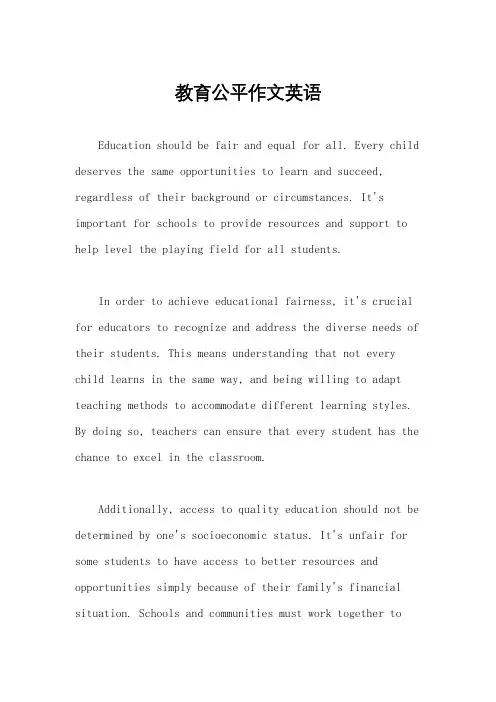
教育公平作文英语Education should be fair and equal for all. Every child deserves the same opportunities to learn and succeed, regardless of their background or circumstances. It's important for schools to provide resources and support to help level the playing field for all students.In order to achieve educational fairness, it's crucial for educators to recognize and address the diverse needs of their students. This means understanding that not every child learns in the same way, and being willing to adapt teaching methods to accommodate different learning styles. By doing so, teachers can ensure that every student has the chance to excel in the classroom.Additionally, access to quality education should not be determined by one's socioeconomic status. It's unfair for some students to have access to better resources and opportunities simply because of their family's financial situation. Schools and communities must work together toprovide equal access to educational resources, regardless of a student's economic background.Furthermore, it's important for schools to create a supportive and inclusive environment for all students. This means fostering a culture of respect and understanding, where every student feels valued and accepted. When students feel safe and supported, they are more likely to thrive academically and socially.In conclusion, education should be a right for all, not a privilege for a few. It's essential for schools to prioritize fairness and equality in order to provide every child with the chance to succeed. By doing so, we can create a more just and inclusive society for future generations.。
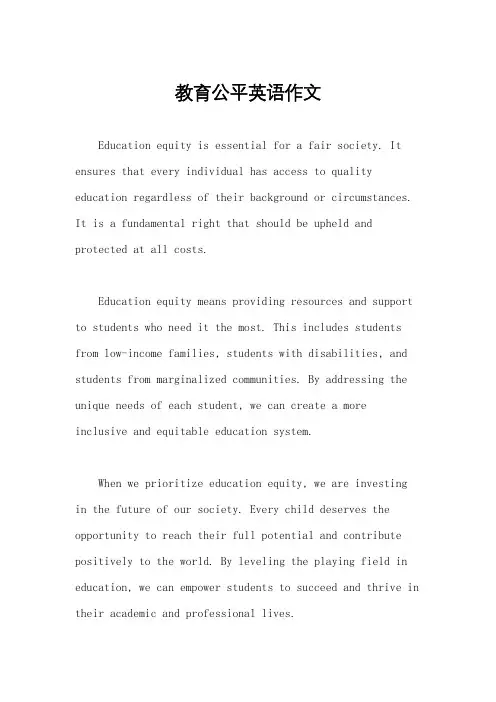
教育公平英语作文Education equity is essential for a fair society. It ensures that every individual has access to quality education regardless of their background or circumstances. It is a fundamental right that should be upheld and protected at all costs.Education equity means providing resources and support to students who need it the most. This includes students from low-income families, students with disabilities, and students from marginalized communities. By addressing the unique needs of each student, we can create a moreinclusive and equitable education system.When we prioritize education equity, we are investing in the future of our society. Every child deserves the opportunity to reach their full potential and contribute positively to the world. By leveling the playing field in education, we can empower students to succeed and thrive in their academic and professional lives.Achieving education equity requires a collective effort from policymakers, educators, parents, and communities. It involves dismantling barriers to access and creating a supportive and inclusive learning environment for all students. By working together, we can ensure that every child receives the education they deserve.In conclusion, education equity is not just a moral imperative, but a necessity for building a fair and just society. It is our responsibility to advocate for equal opportunities in education and ensure that every student has the chance to succeed. Let us continue to strive for education equity and create a brighter future for all.。

教育的公平The Equality of EducationWhen the time comes to the children to go to school, many parents have made some plans and want to arrange suitable schools. Different schools have different requirements, but recently, a special documentary for parents was asked and some parents felt surprised.孩子准备到上学的年纪,许多父母就已经做好计划,想给他们安排合适的学校。
不同的学校对学生会又有不同的要求,但最近,有一份特殊的文件对家长进行一定的要求使得有些父母感到非常惊讶。
Some schools asked parents to go to the police office, as so to get the documentary evidence of free of criminal. As the requirement was exposed, the public was angry and they doubted the necessarity of this document. Actually, many laws have proved the wrong requirement of the school, because it is known to all that the first nine years education is compulsory, which means every child has the right to go to school and they should not be rejected. What’s more, such requirement also goes against the human right. Even if the parents have done something criminal, the children are innocent and they should not betreated different.有些学校要求父母去警察局开一份无犯罪记录的证明文件。
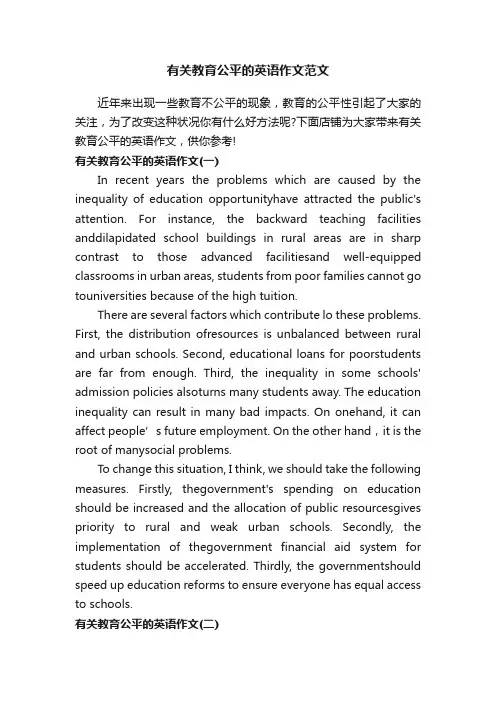
有关教育公平的英语作文范文近年来出现一些教育不公平的现象,教育的公平性引起了大家的关注,为了改变这种状况你有什么好方法呢?下面店铺为大家带来有关教育公平的英语作文,供你参考!有关教育公平的英语作文(一)In recent years the problems which are caused by the inequality of education opportunityhave attracted the public's attention. For instance, the backward teaching facilities anddilapidated school buildings in rural areas are in sharp contrast to those advanced facilitiesand well-equipped classrooms in urban areas, students from poor families cannot go touniversities because of the high tuition.There are several factors which contribute lo these problems. First, the distribution ofresources is unbalanced between rural and urban schools. Second, educational loans for poorstudents are far from enough. Third, the inequality in some schools' admission policies alsoturns many students away. The education inequality can result in many bad impacts. On onehand, it can affect people’s future employment. On the other hand,it is the root of manysocial problems.To change this situation, I think, we should take the following measures. Firstly, thegovernment's spending on education should be increased and the allocation of public resourcesgives priority to rural and weak urban schools. Secondly, the implementation of thegovernment financial aid system for students should be accelerated. Thirdly, the governmentshould speed up education reforms to ensure everyone has equal access to schools.有关教育公平的英语作文(二)At this precise moment in time and with the impending entrance examination, the problem of educational injustice has loomed more conspicuous and has been brought to the center of public attention. It is almost absolutely correct that schools’ misbehavior gave rise to seditions and agony.Dated back to last month, one official representative at the meeting of People’s Representatives put forward the issue of educational partiality, maintaining that the possibility of certain metropolises’ students admitted to Tsinghua University and Peking University is approximately 40 times more than that in Henan province. Recently, when it comes to the enrollment of middle school students, another heated news has been propagated that certain schools enjoying better location, faculty and favorable policies are illegally stretching their legs towards elite students over the whole province, exerting definitely pernicious influences on the regulation of tests and examinations.As a student, I’m sincerely concerned with this. From my own perspective, the leading action we should be encouraged to take is to distribute resources more sensibly. It’s imperative to give more rights for admission to prestigious universities to students in need, which may propitiously precipitate the process of social justice. Also, governmental regulation and punishments are in desperate demand. Banning on such misconducts as searching for students over the boundary in certain schools serves as a solution.What is more, personally, it’s advisable for the school administrators to secure a clear mind that faculty and regulations rather than students are more significant linchpins in maintaining competence and attractiveness.There is still a long way to go for sake of overcoming theperplexity of educational injustice. Notwithstanding, we are bound to accomplish it with fortitude.有关教育公平的英语作文(三)In order to promote equity in education, China has invested 36 billion yuan forthe improvement of educational facilities in rural areas and strengthening of ruralcompulsory education Midwest.These funds were used to improve the teaching facilities,purchase of books, so that more than 160,000 primary and secondary income. Funds are alsoused to purchase music and painting equipment.Now children in rural and mountainousareas with children's coastal cities like music and painting lessons. Some receive a bettereducation for the city school students now transferred back to the local rural schools now.。
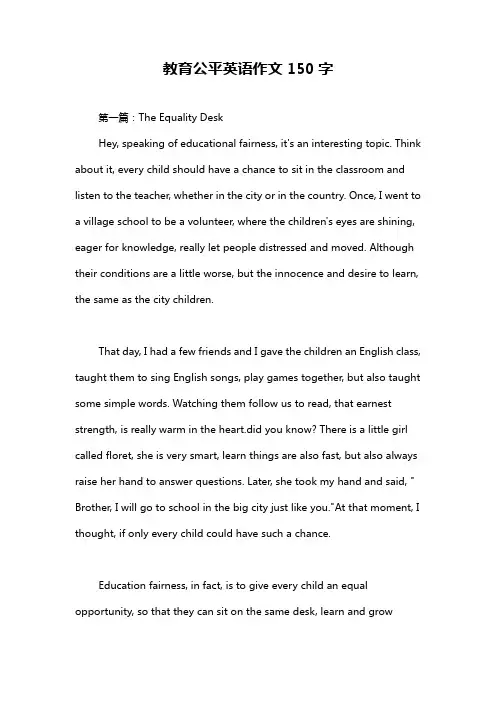
教育公平英语作文150字第一篇:The Equality DeskHey, speaking of educational fairness, it's an interesting topic. Think about it, every child should have a chance to sit in the classroom and listen to the teacher, whether in the city or in the country. Once, I went to a village school to be a volunteer, where the children's eyes are shining, eager for knowledge, really let people distressed and moved. Although their conditions are a little worse, but the innocence and desire to learn, the same as the city children.That day, I had a few friends and I gave the children an English class, taught them to sing English songs, play games together, but also taught some simple words. Watching them follow us to read, that earnest strength, is really warm in the heart.did you know? There is a little girl called floret, she is very smart, learn things are also fast, but also always raise her hand to answer questions. Later, she took my hand and said, " Brother, I will go to school in the big city just like you."At that moment, I thought, if only every child could have such a chance.Education fairness, in fact, is to give every child an equal opportunity, so that they can sit on the same desk, learn and growtogether. Like this, the heart is full of hope.第二篇:Sharing the Blue SkyHi, when it comes to education fairness, I think it's like a cloud in the sky. Everyone should look up and see the same blue sky. Imagine, whether the children in the mountains or the children in the city, can chase their dreams under the same blue sky, how good it should be!Once, I went to attend a lecture on educational equity, and I heard a lot of touching stories. There is a little boy, who lives in a remote mountainous area, every day to walk several hours to go to school. But guess what? He actually got excellent grades and spoke very good English. His greatest wish, he said, is to go to college in Beijing for college one day. Listening to his story, I thought, this child is really wonderful, his dream is worth all the people to work together to achieve.In fact, educational equity is to make every child's dream possible. Just like that little boy, although the journey is far away, but he has a dream in his heart, there is a road at his feet. As long as we can all lend a helping hand, help those children who are not very good conditions, to provide them with more learning resources, then everyone's dream will be closer to the reality.Thinking of this, I think each of us can be a part of promoting educational equity, isn't it?。
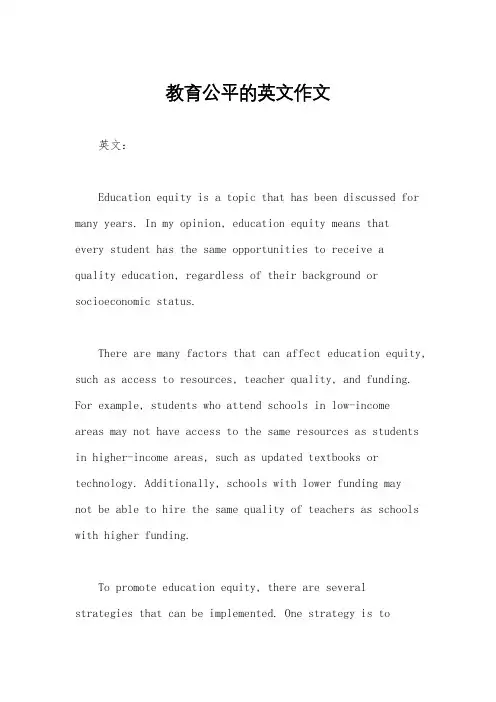
教育公平的英文作文英文:Education equity is a topic that has been discussed for many years. In my opinion, education equity means thatevery student has the same opportunities to receive aquality education, regardless of their background or socioeconomic status.There are many factors that can affect education equity, such as access to resources, teacher quality, and funding. For example, students who attend schools in low-incomeareas may not have access to the same resources as students in higher-income areas, such as updated textbooks or technology. Additionally, schools with lower funding maynot be able to hire the same quality of teachers as schools with higher funding.To promote education equity, there are severalstrategies that can be implemented. One strategy is toincrease funding for schools in low-income areas, so that they have access to the same resources as schools inhigher-income areas. Another strategy is to provide professional development opportunities for teachers, sothat they can improve their skills and provide high-quality instruction to all students.Ultimately, education equity is important because it ensures that every student has the opportunity to reachtheir full potential and succeed in life.中文:教育公平是一个被讨论多年的话题。
Supporting Equality in EducationEducational equality, also referred to as equality in education, is a measure of achievement, fairness, and opportunity in education,according to Wikipedia. The growing importance of education equality is based on the premise that now, more than ever before, an individual’s level of education is directly correlated to the quality of life he or she will live in the future. The issue of educational equality has become more and more significant nowadays with the rapid development of our economy and it has been put forward in governmental occasions several years before. Educational equality is dependent on two main factors. The first is fairness, which implies that factors specific to one’s personal conditio ns should not interfere with the potential of academic success. The second important factor is inclusion, which refers to a comprehensive standard that applies to everyone in a certain education system. These two factors are closely related and are dependent on each other for true academic success of an educational system.The pursuit of fairness in education is a significant issue in China. The Communist Party was born to bring fairness to China. It promoted egalitarianism with some success, though at a poor level of nominal equality, and China's inequality of education remains a major challenge despite its overall improvement of education service. Deputies to the National People's Congress, China's top legislature, must assume responsibility in safeguarding the nation's education, and they must be held accountable. Our leaders must become more aware and act professionally within the present political system. It is fundamental for the health of the next generation. Transforming schools into truly egalitarian institutions requires a holistic and long-drawn approach. However,kids need us to fix our education system now. With a focus on expanding education options for parents and spending our education founding wisely, we can overcome the barriers that exist today in education and give every child a fighting chance for success.。
教育公平英文作文Education equity is a critical issue that needs attention. Every child deserves access to quality education, regardless of their socioeconomic background. Unfortunately, this is not always the case, and many children are left behind due to lack of resources or opportunities.It is crucial to address the root causes of education inequality. Poverty is one of the main factors that contribute to educational disparities. Children from low-income families often lack access to quality schools, teachers, and resources. Therefore, it is essential toinvest in education and provide adequate funding forschools in disadvantaged areas.In addition to financial support, it is also crucial to provide equal opportunities for all students. This means ensuring that every child has access to the sameeducational resources, regardless of their race, gender, or ethnicity. It also means providing support for studentswith disabilities or special needs, so they can receive the same quality education as their peers.Another important aspect of education equity isensuring that teachers are adequately trained and supported. Teachers play a critical role in shaping the future of our children, and they need the necessary skills and resourcesto provide quality education. Therefore, it is essential to invest in teacher training and development programs to help them become effective educators.Finally, it is vital to involve parents and the community in promoting education equity. Parents and caregivers play a critical role in supporting theirchildren's education, and they need to be empowered to do so. Community organizations can also play a role in promoting education equity by providing resources and support for students and families.In conclusion, education equity is a critical issuethat needs attention. It is essential to address the root causes of educational disparities and provide equalopportunities for all students. By investing in education, supporting teachers, and involving parents and the community, we can ensure that every child has access to quality education and a bright future.。
教育机会公平的英语作文标题,Ensuring Equal Educational Opportunities。
In today's world, the concept of equal educational opportunities is paramount. Education is not just a privilege but a fundamental right of every individual. However, achieving true equality in education remains a challenge in many parts of the world. In this essay, wewill delve into the importance of equal educational opportunities and explore strategies to ensure its realization.First and foremost, equal educational opportunities are crucial for fostering a just and equitable society. Education serves as a powerful tool for social mobility, allowing individuals from diverse backgrounds to improve their circumstances and contribute meaningfully to society. When access to quality education is unequal, it perpetuates existing disparities and hinders progress towards a fairer society.Moreover, equal educational opportunities are essential for promoting economic development and competitiveness. In today's globalized economy, a skilled workforce is vitalfor innovation and growth. By ensuring that all individuals have access to quality education, societies can unlock the full potential of their human capital, leading to greater productivity and prosperity for all.However, despite the universal acknowledgment of the importance of equal educational opportunities, achieving this goal remains elusive in many parts of the world. Socioeconomic factors, such as poverty and discrimination, often create barriers to education for marginalized communities. Additionally, disparities in resource allocation and educational infrastructure further exacerbate inequalities in access to quality education.To address these challenges and ensure equal educational opportunities for all, concerted efforts are needed at both the policy and grassroots levels. At the policy level, governments must prioritize education as afundamental human right and allocate sufficient resources to ensure universal access to quality education. This includes investing in infrastructure, hiring qualified teachers, and providing financial assistance to disadvantaged students.Furthermore, policies aimed at addressing socioeconomic inequalities, such as poverty alleviation programs and affirmative action initiatives, can help level the playing field and ensure that all individuals have an equal chance to succeed in education. Additionally, efforts to eliminate discrimination and promote inclusivity in educational institutions are essential for creating a conducive learning environment for all students.At the grassroots level, community engagement and empowerment play a crucial role in ensuring equal educational opportunities. Parents, teachers, and community leaders must work together to identify and address the specific needs of marginalized students. This can involve providing mentorship, tutoring, and other forms of support to help students overcome obstacles and achieve academicsuccess.In conclusion, equal educational opportunities are indispensable for building a fairer, more prosperous society. By ensuring that all individuals have access to quality education, regardless of their background or circumstances, we can unlock the full potential of every human being and create a better future for generations to come. It is imperative that governments, communities, and individuals work together to address the root causes of educational inequality and pave the way for a brighter tomorrow.This essay is a synthesis of various perspectives on the importance of equal educational opportunities and strategies to achieve it. It draws inspiration from the most downloaded essays available online while presenting original ideas and insights.。
Promoting Educational Equity: A GlobalImperativeIn the 21st century, education has become the most powerful tool for personal and societal transformation. However, the reality of educational inequality across the globe remains a stark reminder of the urgent need for change. Educational equity is not just a moral imperative but also a prerequisite for sustainable development and global prosperity. This essay explores the concept of educational equity, its importance, challenges, and strategies to promote it.**Conceptual Framework**Educational equity refers to the principle of providing equal educational opportunities and resources to all individuals, regardless of their social, economic, cultural, or geographical backgrounds. It aims to eliminatedisparities in access, participation, and outcomes in education, ensuring that every child has the right to a quality education.**Importance of Educational Equity**Educational equity is fundamental to building inclusive and equitable societies. It is a prerequisite for eradicating poverty, reducing social tensions, and promoting sustainable development. By providing equal educational opportunities, we empower individuals to break the cycle of poverty, achieve their full potential, and contribute to the economic and social progress of their communities.**Challenges to Educational Equity**Unfortunately, educational inequality persists despite the universal recognition of its importance. Factors such as poverty, gender discrimination, cultural and linguistic barriers, and geographical disparities continue to hinder access to quality education for many children and adolescents. Additionally, inadequate investment in education, inequitable distribution of resources, and ineffective policies and practices further exacerbate the problem.**Strategies to Promote Educational Equity**To address these challenges and promote educational equity, several strategies can be implemented. Firstly,governments must prioritize education in their policies and increase investment, particularly in under-resourced and marginalized communities. This will ensure that allchildren have access to quality education and the necessary resources to succeed.Secondly, inclusive education practices that cater to the diverse needs of all students must be adopted. This includes providing accommodations and support for students with special needs, promoting gender equality in education, and recognizing the value of diverse cultural andlinguistic backgrounds.Thirdly, partnerships and collaborations between governments, non-governmental organizations, and theprivate sector can foster innovative solutions to educational inequality. By pooling resources and expertise, these partnerships can expand access to education, improve the quality of teaching and learning, and create sustainable systems for educational equity.Lastly, monitoring and evaluation mechanisms must be established to track progress and identify areas where further action is needed. By collecting and analyzing dataon educational outcomes, disparities, and barriers, we can inform policy decisions and ensure that educational equity remains a central focus of development efforts.**Conclusion**Promoting educational equity is a crucial step towards building more inclusive, equitable, and sustainable societies. It requires concerted efforts from all stakeholders, including governments, educators, communities, and individuals. By prioritizing education, investing in under-resourced communities, adopting inclusive practices, fostering partnerships, and establishing monitoring and evaluation mechanisms, we can ensure that every child has the right to a quality education and the opportunity to shape a better future for themselves and their communities. **促进教育公平:全球性的迫切需求**在21世纪,教育已成为个人和社会变革的最强大工具。
Promoting Educational Equality: A SharedResponsibilityIn today's interconnected world, the importance of education cannot be overstated. It is the key to unlocking one's potential, enabling individuals to reach their full capabilities and contribute meaningfully to society. However, the reality is that educational opportunities are not evenly distributed across the globe. Educational inequality persists, creating significant disparities in access, quality, and outcomes. Addressing this issue is crucial to fostering a more inclusive and equitable society. To promote educational equality, a multipronged approach is necessary. Firstly, it is essential to ensure universal access to education, regardless of one's socio-economic status or geographical location. This involves allocating resources to ensure that schools and educational facilities are available in rural and urban areas alike. Additionally, efforts should be made to reduce the cost of education, making it more affordable for families.Secondly, the quality of education must be improved, particularly in under-resourced areas. This requires afocus on teacher training and professional development, ensuring that educators have the skills and knowledge necessary to provide an effective education. Furthermore, the use of technology can help bridge the gap by providing remote learning opportunities and digital resources that enhance teaching and learning.Moreover, it is important to recognize that educational equality goes beyond the classroom. It involves providing equal opportunities for extracurricular activities,cultural experiences, and higher education. This requires a commitment from governments, communities, and individuals to create a culture that values and supports diverse learning experiences.Additionally, inclusive education practices that cater to the needs of all students, including those with special needs or from marginalized communities, are crucial. This involves creating an inclusive learning environment that is sensitive to diverse backgrounds, abilities, and learning styles. By doing so, we can ensure that every student has the chance to succeed and reach their full potential.Furthermore, it is essential to address the root causes of educational inequality. This includes addressing social and economic disparities that often prevent individuals from accessing quality education. Policies that promote social justice and economic equality can help create a more equitable society where everyone has equal access to educational opportunities.In conclusion, promoting educational equality is a shared responsibility that requires the commitment and collaboration of governments, communities, and individuals. By ensuring universal access, improving the quality of education, providing equal opportunities, and addressing the root causes of inequality, we can create a more inclusive and equitable world where every individual has the chance to reach their full potential.**促进教育平等:共同的责任**在当今紧密相连的世界中,教育的重要性不言而喻。
教育公平与质量英语作文Education Equity and QualityEducation equity and quality are two fundamental goals that every education system should strive to achieve. Education equity refers to providing all students with the same opportunities to succeed, regardless of their background or circumstances. On the other hand, education quality is about ensuring that students receive a high standard of education that prepares them for the challenges of the future.Education equity is important because it promotes social justice and equal opportunities for all. When every student has access to the same resources and opportunities, regardless of their race, gender, or socioeconomic status, it creates a fairer society. This not only benefits individual students, but also contributes to the overall well-being and prosperity of a nation.Education quality is equally important as it ensuresthat students are receiving the best possible education. A high-quality education provides students with the knowledgeand skills they need to succeed in higher education, the workforce, and in life. It also helps to foster critical thinking, creativity, and problem-solving abilities, which are essential for success in the 21st century.In conclusion, education equity and quality areessential for creating a fair and prosperous society. By ensuring that all students have equal opportunities and receive a high standard of education, we can help to builda better future for everyone.教育公平与质量教育公平和质量是每个教育系统应努力实现的两个基本目标。
Supporting Equality in Education
Educational equality, also referred to as equality in education, is a measure of achievement, fairness, and opportunity in education,according to Wikipedia. The growing importance of education equality is based on the premise that now, more than ever before, an individual’s level of education is directly correlated to the quality of life he or she will live in the future. The issue of educational equality has become more and more significant nowadays with the rapid development of our economy and it has been put forward in governmental occasions several years before. Educational equality is dependent on two main factors. The first is fairness, which implies that factors specific to one’s personal conditio ns should not interfere with the potential of academic success. The second important factor is inclusion, which refers to a comprehensive standard that applies to everyone in a certain education system. These two factors are closely related and are dependent on each other for true academic success of an educational system.
The pursuit of fairness in education is a significant issue in China. The Communist Party was born to bring fairness to China. It promoted egalitarianism with some success, though at a poor level of nominal equality, and China's inequality of education remains a major challenge despite its overall improvement of education service. Deputies to the National People's Congress, China's top legislature, must assume responsibility in safeguarding the nation's education, and they must be held accountable. Our leaders must become more aware and act professionally within the present political system. It is fundamental for the health of the next generation. Transforming schools into truly egalitarian institutions requires a holistic and long-drawn approach. However,kids need us to fix our education system now. With a focus on expanding education options for parents and spending our education founding wisely, we can overcome the barriers that exist today in education and give every child a fighting chance for success.。